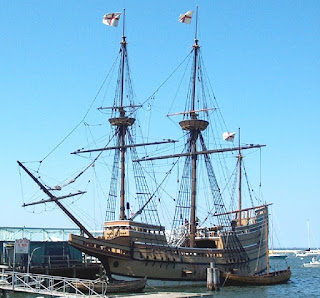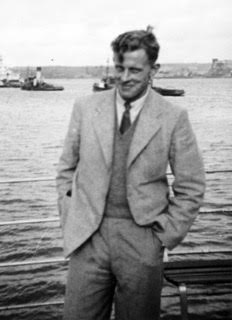Not just storms in tea-cups

Mayflower II at State Pier in Plymouth. The Mayflower II is a replica of the 17th century ship Mayflower, celebrated for transporting the Pilgrims to the New World. The replica was built in Devon, England, during 1955–1956. Photo credit: Wikipedia
I've always had an idealised view of our sister-town of Brewster on Cape Cod.
Perhaps the Irish immigrant element in my own family background moved me when I thought of those early New Englanders bravely setting out across the Atlantic, leaving behind all the intolerance and prejudice of Europe to seek freedom and a fresh start in their New World communities.
So I had a cosy picture of proudly independent Brewster, a mini-state within the state of Massachusetts, with its own respected Chief of Police, its highly qualified Fire Chief, its idealistic and hardworking Town Manager, its iconic Ladies' Library with all those free concerts and exhibitions, and of course its own budget.
A community with shared common values of decency, tolerance and enlightened respect for its beautiful environment. And that included some admirably progressive views on the need for the town to be self-sufficient in energy needs.

In 2003 an Alternative Energy Committee was created in the belief that the answer to the worldwide energy crisis lay in wind. Four years later a wind energy bylaw was passed and Brewster's selectmen - the equivalent of our town councillors - were authorised to negotiate with the Cape & Vineyard Electric Cooperative (CVEC). This group had been created in 2008 "to provide the municipalities of Cape Cod and Martha’s Vineyard a way to work together to integrate clean, renewable energy as part of a more sustainable Cape Cod and Martha’s Vineyard" as stated on its website at http://www.cvecinc.org/
To be sure there were protesters but they were condemned by some fairly eminent voices from the moral high ground. Here's Brewster resident Joe Klein, celebrated journalist and author of the book Primary Colors, attacking one particular group of dissenters.
"Can I just say that the opposition to Cape Cod Wind Farm, in Nantucket Sound, is one of the most blatant cases of NIMBYism I've ever seen" he wrote just over a year ago in Time Magazine. "I'm terribly sorry that the wind farm will spoil their sunrises and turn their sailing into slalom, but this is alternative energy we're talking about here. It's a no brainer and I hope Interior Secretary Ken Salazar will put an end to the slow-walk forthwith. (And I'd be happy to welcome a second wind farm over on my side of the Cape, in Cape Cod Bay.)"
Well, fortified by support from Mr Klein and others who shared his vision, the Brewster town authorities powered ahead. “The president of the United States has made it part of his program to have renewable energy projects. The governor of the state has made it part of his program,” noted Ed Lewis, selectmen chairman, so why not Brewster, he wondered.
The two, 410-foot-tall turbines would be built on leased town land, next to the Captains Course driving range, in Commerce Park, off Freeman’s Way, within view of Route 6. They were, or are, expected to generate $3.6 million in electrical energy cost savings and lease payments for Brewster over the first 15 years of operation.
It was, so the experts said, a "slam-dunk" as I noted at http://budleighbrewsterunited.blogspot.com/2009/06/brewster-contemplating-wind-turbines-on.html
I hadn't come across that expression before but I could guess what it means.

Yes, wind turbines can catch fire
But with the New Year and stormy weather came, ironically, the surge of protest from many Brewster residents that I described at http://budleighbrewsterunited.blogspot.com/2011/01/storm-brews-over-wind-turbines-plan.html
By 11 February 329 protesters had signed a petition. People began talking about property values, fire and ice hazards, blade throw, and even, apparently "static electricity emanating from the towers." They felt themselves to be, as the Cape Codder newspaper so picturesquely put it, "sacrificed on the altar of green energy."
Above all, there was the argument, so familiar in small, peacefully contented communities which include both the Cape Cod town and its East Devon sister Budleigh Salterton, that the turbines "didn’t fit Brewster’s rural character."
A week later came the news that a majority of selectmen on the planning board had voted against wind turbines. And Brewster is not alone. Apparently it's the fourth local project of its kind to be voted down, with similar protests winning the day in the Cape Cod towns of Wellfleet, Harwich and Orleans. The neighbouring community of Dennis is the latest to see antis in the majority at a public meeting last Monday 11 April.
But the battle is not yet over. I've now read that the town authorities have been accused of seeking to circumvent the planning board's decision by "cutting red tape." The Cape and Vineyard Electric Cooperative has told Brewster selectmen that the group will seek an exemption under state law allowing them to build two municipal wind turbines in the industrial park without a special permit from the town.
Turbine foe Mitch Relin is not surprised. "It seems like the board of selectmen, in concert with CVEC, is going outside the town process that is in place and that seems appropriate, and that is disheartening,” he says. Others, like Brewster resident Joyce McConnell, are more forthright. "The town selectmen now appear prepared to propose elimination of the democratic process governing our local elected officials," she wrote in a letter to the Cape Cod Times.
Equally there are those who still believe that Brewster should take the lead in developing wind energy. "It is a good thing, right now and for the future, for our town and for Cape Cod," was the view of local resident Paul Hush in his letter to the same newspaper.

Proposals for the demolition of the the Longboat Café on Budleigh Salterton's sea front have shocked many local residents. The café's replacement by a modern building would, so the Town Council suggested, be like a "carbuncle perpetrated upon the face of an old friend." Very few planning applications "have given rise to such strong and diametrically opposed feelings about the proposal" noted East Devon District Council
All that talk of ignoring democracy and public opinion, and the notion that some communities are simply "not the place" for certain developments, have inevitably put me in mind of our own agonisings about a certain café on our sea-front.
The issue is sufficiently divisive within East Devon for Budleigh Salterton Town Council, in an Open Letter dated 1 November 2009, to have accused the more powerful East Devon District Council of being seen as "having little regard for the democratic process" and riding "roughshod over moderate opinion."
Many Budleigh people would agree that the Longboat Café would be improved with a certain amount of updating, but equally a large number feel that the design approved by the District Council is not appropriate for a location which has been officially classed as a World Heritage Site.
Some would say that by comparison with most important issues in today's world the arguments over wind turbines and beachside cafés are no more than storms in Brewster and Budleigh tea-cups. Others would say that it's heartening to read of communities composed of people passionate about their local environment, prepared to stick their neck out and protest rather than toe the party line just because it's politically correct.



Interesting article, Michael. I noticed that your photograph of the Longboat cafe also includes two private houses on the bank behind the coast road which have been (in my opinion) over-modernised in exactly the way the cafe is proposed to be. I don't think reisents objected to those, so why to the cafe changes? They can't have it both ways!
ReplyDelete